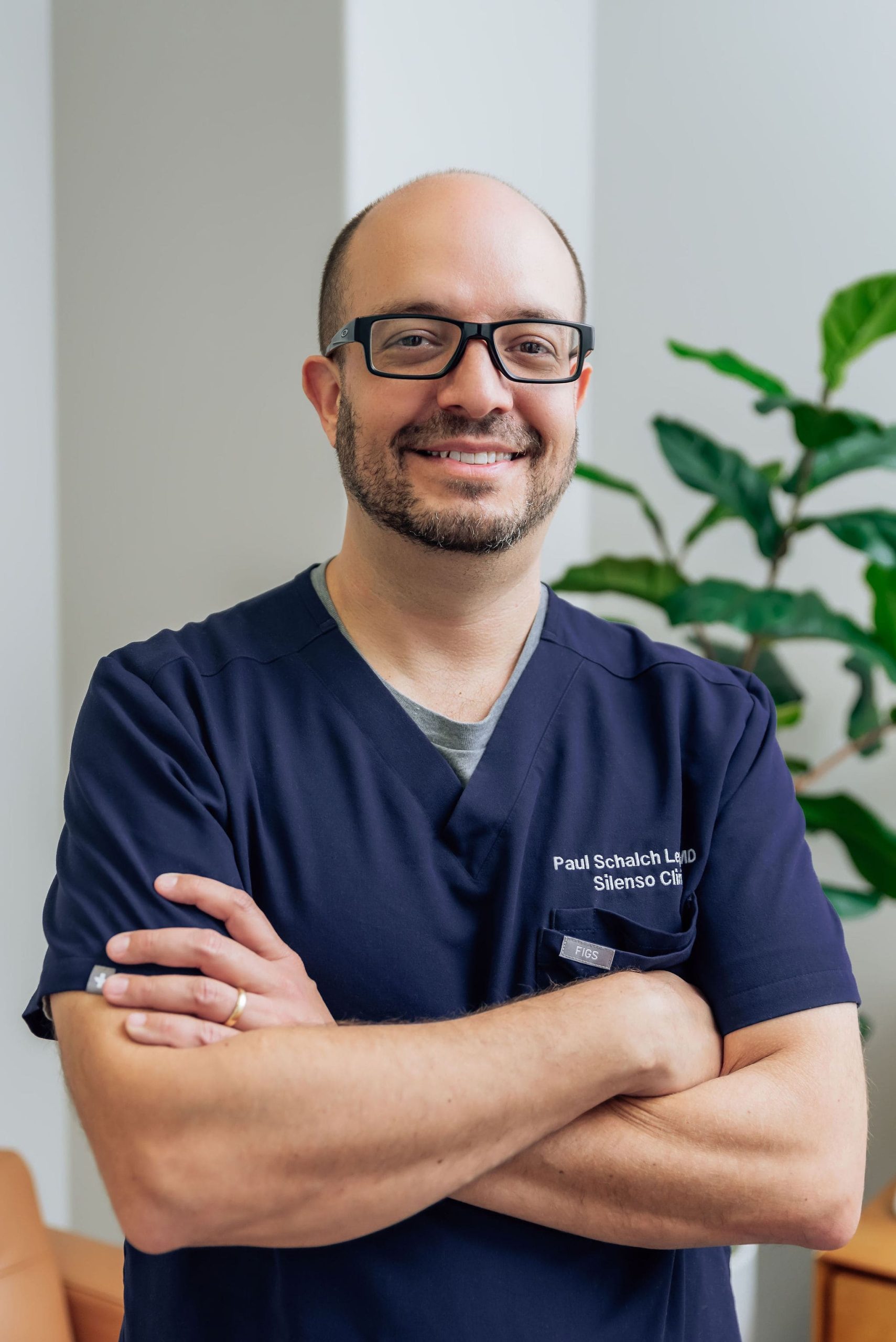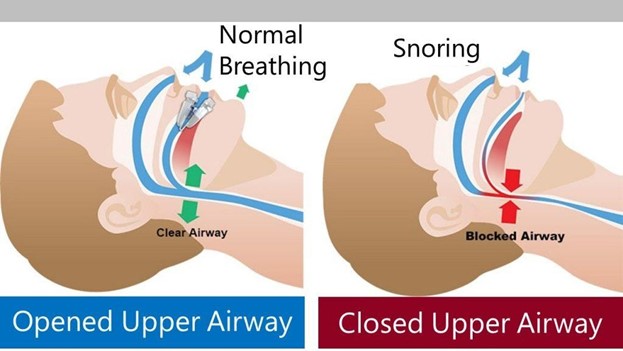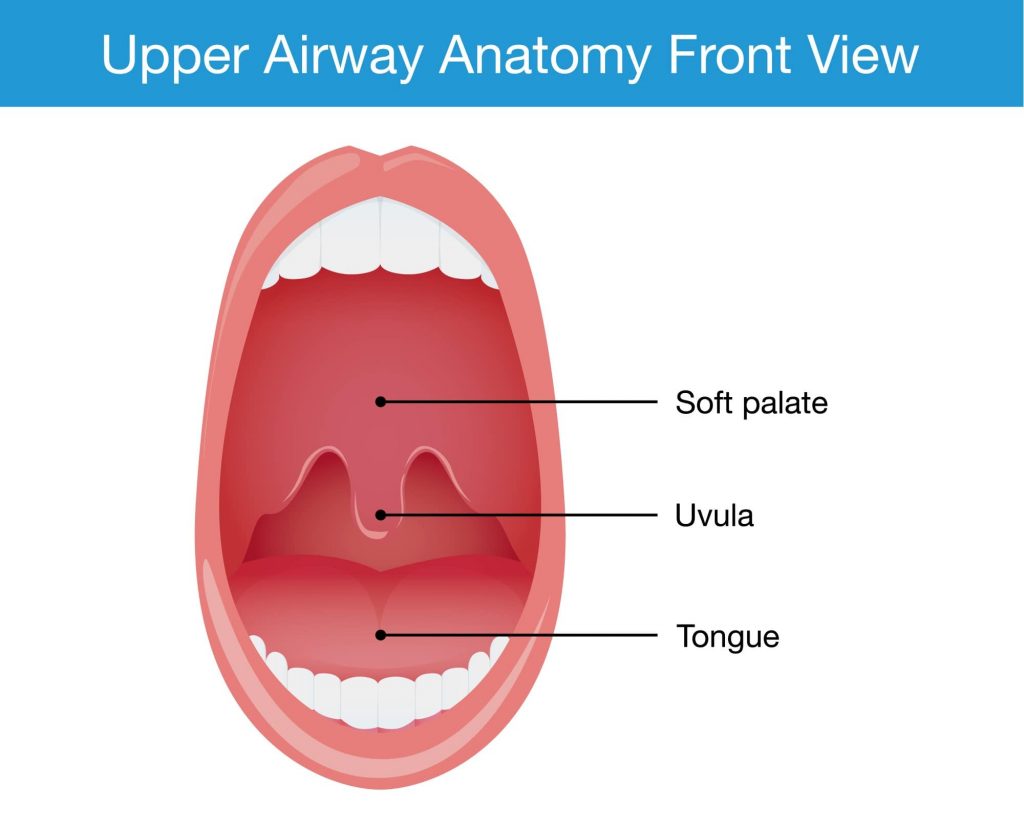Snoring Treatment in San Diego, CA at Silenso Clinic
Snoring is detrimental to both whoever is unfortunate enough to hear it and the person who snores. It can increase the risk of heart attacks, strokes, and high blood pressure, and it also reduces sleep quality. Snoring is also indicative of other serious underlying issues, such as obstructive sleep apnea.
At Silenso Clinic in San Diego, CA, sleep and snoring specialist Dr. Paul Schalch Lepe helps patients find relief from their snoring and ultimately lead more enjoyable lives. To arrange a consultation to discuss San Diego snoring treatments, Dr. Schalch Lepe invites you to contact him by calling (858) 925-5800 or filling out his online form today.

Specializing in the treatment of a variety of conditions (deviated septum, nasal obstruction, snoring, obstructive sleep apnea, etc.), Dr. Schalch Lepe is highly qualified and motivated to provide his patients with the best possible treatment results. Dr. Schalch Lepe takes an in-depth, personalized approach with each patient to ensure they receive the best possible treatment for their situation.
Originally from Mexico City, Mexico, Dr. Schalch Lepe has the unique perspective of having trained in multiple countries. This experience has led him to be sought out by domestic and international patients, many of whom are Mexican ex-pats living throughout San Diego County and Southern California.
What is Snoring?
Snoring is a noise created by inhaling and exhaling deeply through a constricted airway, leading to vibrations in the patient’s throat tissue. The narrower the throat and air passages, the more intense the vibrations, and the louder the sound.
Snoring is caused by a constriction of the airways, meaning air needs more force, or a greater suction and exhalation power, to enter and leave the body. Thus, patients with light or sporadic snoring might experience it as a result from relaxed muscles due to pre-sleep alcohol consumption, whereas other patients with louder snoring might be experiencing, for example, their soft palate or the base of their tongue completely closing the airway.

As displayed here, snoring occurs when part of the airway becomes blocked or constricted. This blockage can occur at different parts of the airway, which will determine the type of treatment required. Source
Most snorers are unaware of their problem due to the fact it occurs during sleep. However, depending on the severity of snoring, or the loudness of the sound, it can be disconcerting to other individuals, and in some cases, might even wake the patient.
For this reason, snoring typically requires a sleep test for initial diagnosis to assess the severity and risk of the condition.
What Causes Snoring?
Many factors can contribute to snoring.
In some instances, snoring might be created simply by the physiology of a patient. Those with a larger than average tongue and a smaller than average air passage are more likely to experience the problem. Large tonsils contribute significantly to snoring and airway obstruction. A common physical exam finding is a long, thick uvula, that tends to swell from time to time.

A deviated septum can also contribute to snoring by blocking the nasal passages. An overbite could cause a person’s jaw to be positioned in a way that could block the airway.
Age can cause a weakening of the cartilage in the nose, throat, and other air passages. Also, alcohol, tobacco, and other drugs can reduce muscle tone in the throat.
Snoring is a common symptom of sleep apnea. Sleep apnea is a sleep disorder characterized by pauses in breathing during sleep. Sleep apnea is more common in overweight men over 40 years of age, but it can affect anyone. Patients stop breathing for ten seconds or longer, causing lethargy and poor performance at work upon waking up due to sleep disruption. Snoring usually precedes sleep apnea by 5-10 years.
Patient Testimonial
How is Snoring Diagnosed?
In the first instance, if your partner tells you that you snore, or if you suspect you’re snoring, Dr. Schalch Lepe will suggest a consultation.
He will begin by asking questions regarding the symptoms and medical history of the patient. A physical examination may be necessary to determine if there is an underlying condition that leads to increased breathing effort during sleep, such as allergies or even heart or lung disease.
Depending on the results of the examination, Dr. Schalch Lepe might well suggest a sleeping test using a WatchPAT device. The device attaches to three different points on your body while you sleep. It is designed to measure:
- Heart rate
- Oxygen levels
- Body position
- Snoring
- Chest motion
The results of your sleep test are then downloaded from the WatchPAT device, and you and Dr. Schalch Lepe will examine your sleep and snoring and patterns together.
The readouts from this test will reveal what type of sleeping ailment you’re suffering from and will inform the next steps to take.
Snoring can also be a subjective symptom (it is in the “ear of the beholder”). Dr Schalch Lepe often recommends patients download an app to record and analyze their snoring, so that we have a more objective parameter of how severe the snoring is, and how well you have responded to the different treatment strategies. Download the SnoreLab app by clicking here.
Better Breathing Starts Today!
Dr. Paul Schalch Lepe is a renowned breathing and sleep surgeon. His greatest pride is giving his patients the ability to breathe, sleep, and feel their best using the latest, innovative surgical and non-surgical procedures.
How Can Snoring be Treated?
There are several effective methods of treating snoring. Treatment may include those common methods used by physicians, namely medications and surgery.
However, other technologically advanced options can treat snoring more effectively and conveniently than ever before. Silenso Clinic’s state-of-the-art treatments include:
Elevoplasty®
Elevoplasty offers a therapeutic option for patients who seek relief from snoring and aren’t interested in wearing an oral appliance at night or willing to have palate surgery. Elevoplasty lifts and stiffens the soft palate by placing three bi-directional, barbed, resorbable suture implants.
Elevoplasty offers:
- Effective snoring relief for the patient (and their partner)
- Relief from airway obstruction
- A minimally invasive outpatient procedure
- Excellent results achieved without wearing an oral appliance at night
Patients who snore but do not suffer from sleep apnea are typically the most suitable candidates for Elevoplasty. Dr. Schalch Lepe will examine you and consider many factors to see if Elevoplasty is right for you.
Valam® Snoring Rx Laser
The Valam diode laser presents a new, minimally invasive, and effective snoring relief method. The innovative procedure works by using a precise diode laser to target the nasal surface of the uvula and soft palate, stiffening the tissue and thereby reducing snoring.
Valam Snoring Rx laser:
- Alleviates snoring for most patients
- Is inexpensive
- Has minimal discomfort
- Is a safe, accurate, and effective
- Can be performed in the office with local anesthesia
- Offers a quick recovery
- Does not interfere with oral intake (eating and drinking)
The laser is best for patients who:
- Display normal or very mild sleep apnea events
- Have an elongated or thick uvula and small tonsils
- Have no other sleep-related comorbidities
- Suffer from persistent palatal snoring
For some patients, a combination of Elevoplasty and the Valam laser may be the best course of action. Meeting with Dr. Schalch Lepe is the best way to find out the treatments that have the best chance of relieving your snoring.
Oral Devices
eXcite OSA
The eXcite OSA is a revolutionary oral device that helps individuals suffering from snoring and mild obstructive sleep apnea (OSA).
This innovative device leverages neuromuscular electrical stimulation (NMES) to strengthen and tone the muscles of the tongue and upper airway, effectively reducing the incidence of airway collapse during sleep. Unlike traditional continuous positive airway pressure (CPAP) machines, eXcite OSA offers a non-invasive, comfortable, and discreet solution, enabling users to experience a restful night’s sleep without the inconvenience of bulky masks or noisy equipment.
eXcite OSA is a daytime therapy strategy that can help as a stand alone modality, or complement the efficacy of nighttime treatment strategies such as oral appliances. It can also work as an adjunct to procedures performed for snoring and obstructive sleep apnea. It is non-invasive, self-administered, and easy to use.
With its user-friendly design and personalized treatment plans, the eXcite OSA device has the potential to revolutionize OSA therapy, improving the quality of life for millions of people affected by this common sleep disorder.
Ready to Find Relief from Snoring?
The complex and nuanced causes of snoring means treatment also need to be diverse and patient-specific. As a leading snoring and sleep surgeon, Dr. Schalch Lepe prides himself on his personalized approach to ensuring that every patient is treated according to their circumstances. This is vital in finding an effective, long-term solution to snoring and improving quality of life.
Arrange your consultation today by calling (858) 925-5800 or filling out our online form. Our breathing and sleep center is located in Carmel Valley and serve patients coming from La Jolla, Carlsbad, Encinitas, Del Mar, Coronado, Eastlake, Chula Vista, Rancho Santa Fe, and other areas of San Diego County. Here at Silenso Clinic, we also offer treatments for a number of other conditions, including deviated septum, nasal obstruction, chronic rhinitis, obstructive sleep apnea (OSA), and chronic tonsillitis (tonsil stones).
Snoring Treatment San Diego - FAQs
Snoring treatment is not typically covered by insurance. However, depending on the type of treatment and the condition causing snoring, some insurance companies may cover part or all of it.
In addition, some snorers may be eligible for a sleep study to determine if they have untreated sleep apnea. If so, these patients can find comfort in knowing that the problem can be treated and their quality of life improved through proper and affordable treatments and methods.
Snoring treatments are becoming increasingly effective.
In some cases, treatment will require a change of lifestyle or behavior – such as avoiding alcohol before bed, losing weight and elevating your head at night.
For other patients, surgery might permanently widen the airway, which will address the issue.
In other instances, patients will need habitual use of aids such as CPAP machines or the Inspire device – but nonetheless, these treatments are highly effective and have life-changing effects.
Snoring can affect both patients and those sleeping near the patient.
The person experiencing the noise of snoring may experience sleep deprivation and come down with the symptoms of fatigue and lethargy upon waking up.
Family members sleeping near someone who snores may find it hard to sleep, leading to irritability, difficulty concentrating, poor performance at work or school, and headaches. The latter should not necessarily be attributed to snoring but rather lack of sleep over a prolonged period of time. All of these issues may lead to serious health consequences if not adequately addressed.
Snoring is common, but it is not considered normal. In fact, snoring is the most common symptom associated with obstructive sleep apnea (OSA). It is also a common source of problems with bed partners, and it can cause significant distress in your personal relationships. Problematic snoring should always be addressed as a potential symptom of a more severe condition.
While snoring can be more common in men than in women, the likelihood of OSA starts to even out in middle age, after menopause. Severe snoring in men and women should be addressed as a potential symptom of more serious conditions.
No. Severe snoring in children should be brought to the attention of your pediatrician.
It can be, particularly because it is a very common symptom of OSA.
It depends on a number of factors, including nasal obstruction, enlarged tonsils, body weight, and other findings that may indicate upper airway obstruction.
Yes, it can be a very good option, particularly when fitted by a board certified dental or medical sleep medicine specialist.
Snoring and sleep apnea don’t always need to be treated together. The need to treat primary snoring (snoring w/o concurrent OSA) is largely dependent on how much of a problem it represents for the individual and their bed partners and other people that might be affected by the presence of snoring. There are multiple options, including office-based, minimally-invasive, and laser-assisted procedures that can be done under local anesthesia.
Smoking is an indirect factor in snoring. It can cause nasal congestion, which will affect and worsen snoring. In general, smoking is dangerous and harmful to your health, and we advise quitting smoking.
Yes. Alcohol is known to affect sleep in general and worsen snoring, particularly at the beginning of the night. Avoiding alcohol intake at night will have a significant positive impact on decreasing snoring and restoring normal sleep architecture, as well as a positive effect on health in general.
Losing weight and ensuring adequate breathing through your nose will positively affect snoring. You can also try elevating your head and avoiding alcohol intake, as well as avoiding eating large meals right before going to bed.
If snoring is causing distress to you or your bed partner, you should seek care and have a specialist address any underlying conditions, including OSA. There are many options to treat disruptive snoring: non-invasive, procedural, and even surgical. We encourage you to discuss your snoring concerns with your sleep and breathing specialist.
